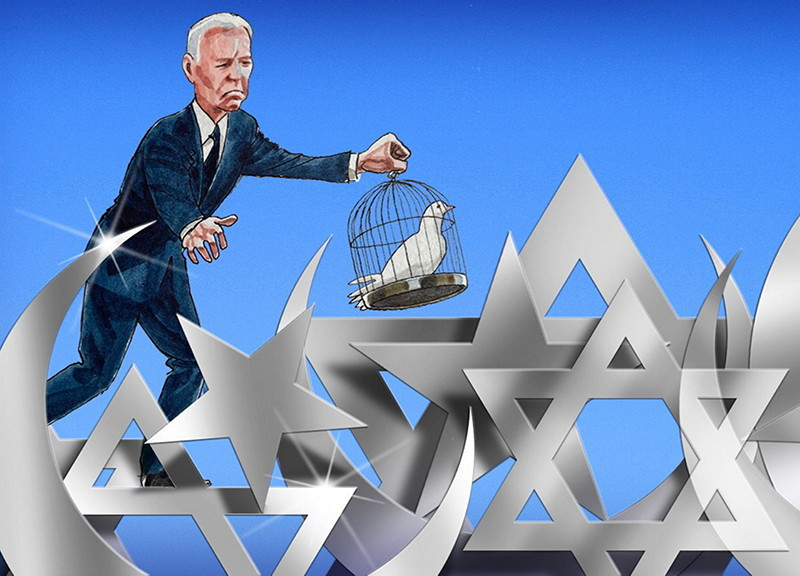
A Middle East grand bargain could be a grand illusion
GIDEON RACHMAN - Financial Times
From Kissinger to Carter, and from Clinton to Kushner, the urge to broker peace deals in the Middle East is a constant in American diplomacy. Now it is the turn of the Biden administration to set off down this well-trodden path.
The White House is working on a “grand bargain” in the Middle East that would lead to the normalisation of relations between Israel and Saudi Arabia. To help bring this about, the US is reportedly prepared to offer security guarantees to Saudi Arabia, as well as assistance for a civil nuclear programme. Israel’s part of the bargain is that it would offer some concessions towards the Palestinians.
For its promoters, Joe Biden’s grand bargain delivers several seductive-sounding “wins”. It would extend peace, prosperity and stability in the Middle East. It would bolster the US in the struggle for global influence with China. And it would give Biden a diplomatic achievement to boast about, in time for the 2024 presidential election.
Unfortunately, the reality of the deal could be much less attractive. The US could end up promising to defend an erratic autocracy in Saudi Arabia, while bolstering an Israeli government that is fast eroding its own democracy. Meanwhile, the hoped-for gains — pushback against China and progress for the Palestinians — may never materialise. In that case, the grand bargain will turn out to be a grand illusion.
Relations between Saudi Arabia and the US have been rocky during the Biden administration. The kingdom’s de facto ruler, Mohammed bin Salman, was angered by the release of a US government report that accused him of direct involvement in the murder of Jamal Khashoggi, the Saudi journalist. The red-carpet treatment for Xi Jinping when he visited Saudi Arabia, was notably warmer than the reception given to Biden.
It was China, not the US, that helped to broker peace between Iran and Saudi Arabia last March. And the Saudis have just announced that they will join the Brics, which increasingly looks like Beijing’s answer to the G7.
All this has created unease in Washington — which is doubtless part of the point. The Biden administration had wanted to disengage from the Middle East and focus on the rise of China. But the flirtation between Riyadh and Beijing helped to persuade the White House that re-engagement in the Middle East was necessary, as part of the global competition for influence with China.
The US-China struggle to shape the global order is taking place on many fronts — including finance, trade, security and regulation. As a large economy, a G20 member and the world’s second-largest oil producer, Saudi Arabia is unavoidably a big player in all those domains. So pulling the Saudis back into the US camp has become a goal for Washington.
However, while the attractions of the US-Saudi-Israel deal are clear, so are the risks.
Unlike other countries that America has pledged to defend — such as Japan or Germany — Saudi Arabia is nobody’s idea of a democracy. The country’s human rights record remains grim. Human Rights Watch recently released a report, accusing the kingdom of shooting dead hundreds of Ethiopian refugees.
Even close Biden allies in Washington, such as Senator Chris Murphy, are uneasy. As Murphy explained to me recently, he has big questions about “guaranteeing the protection of a big country in the Middle East that tends to get into fights with its neighbours fairly often”. The senator believes that the battle for global influence with China is ultimately “about which form of government this world is going to live under”. “Getting closer and closer to brutal dictatorships makes it a lot harder . . . to try to sell democracy.”
Since Murphy heads the Middle East subcommittee of the Senate foreign relations committee, his views matter. It would be a real own goal for the Biden administration if it were to conclude a new treaty, only to find that it cannot get it through Congress.
The Israeli side of the bargain also presents problems. The current government, led by Benjamin Netanyahu, is widely accused of undermining Israeli democracy. Netanyahu’s coalition contains “horrible racist parties” — in the words of Tamir Pardo, a former head of the Israeli intelligence agency, appointed by Netanyahu himself. Those parties are accelerating the expansion of Israeli settlements, at the expense of the Palestinians — while violence in the occupied territories surges.
Netanyahu is on trial for corruption — which should ring an alarm bell or two in the Biden White House. But one thing that might rescue the Israeli prime minister’s domestic political position is playing the statesman by presiding over a historic peace deal with Saudi Arabia.
Supporters of the grand bargain respond that, as part of the deal, Israel will have to make concessions to the Palestinians. These could revive the two-state solution, while forcing Netanyahu to go into coalition with more moderate parties. But there are many ways for Netanyahu to wriggle out of any theoretical concessions to the Palestinians. And it is very doubtful that either the Saudis or the Americans would have the means or the will to force genuine progress towards a two-state solution.
The Biden administration’s Middle East grand bargain can sound alluring. But it risks rewarding the wrong people, at the wrong time, for the wrong reasons.














